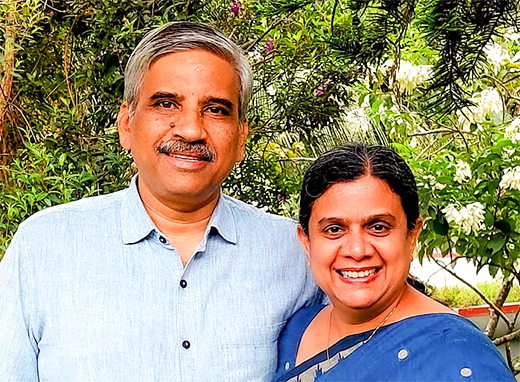
Mangaluru Doctors’ TB Research Prompts Major Change in WHO Guidelines
Mangalore Today News Network
Mangaluru, Oct 12, 2025: Groundbreaking research by a Mangaluru-based doctor couple has led the World Health Organisation (WHO) to revise its global tuberculosis (TB) treatment guidelines, placing new emphasis on food and nutritional support for both patients and their families.
Dr. Anurag Bhargava of Kasturba Medical College and Dr. Madhavi Bhargava of Yenepoya Medical College conducted an Indian Council of Medical Research (ICMR)-supported trial that demonstrated the critical role of nutrition in reducing TB transmission and improving survival rates.

Their study, known as the RATIONS (Reducing Activation of Tuberculosis by Improvement of Nutritional Status) trial, showed that providing food support to household contacts of TB patients cut the risk of new TB infections by nearly half. Simultaneously, nutritional support for patients improved their chances of recovery and survival significantly.
Earlier this week, the WHO incorporated these findings into its consolidated guidelines on tuberculosis and undernutrition, recommending “provision of food assistance to prevent TB in household contacts of people with TB in food insecure settings.” The organisation cited five studies by the Bhargavas and their collaborators as key evidence supporting this policy change.
The RATIONS trial, involving around 2,800 TB patients and over 10,000 family members across four districts in Jharkhand, provided each adult participant with a monthly food basket containing 5 kg of rice, 1.5 kg of lentils, and multivitamin tablets. The intervention reduced new cases of infectious pulmonary TB among household members by 48%.
“The risk of TB in family members is much higher due to shared environments of poverty and food insecurity,” said Dr. Madhavi Bhargava. “A family-based approach not only improves treatment outcomes but also helps reduce the overall TB burden in the long term.”
Following the trial’s success, state governments in Jharkhand, Tamil Nadu, and Himachal Pradesh have begun distributing food baskets to families of TB patients. The Union government has also increased monetary assistance to help patients access better nutrition.
India has the world’s highest TB burden, with over 28 lakh new cases and more than 3.2 lakh deaths in 2023 — translating to 37 deaths every hour. In Karnataka alone, TB claims nearly 5,000 lives annually.
“Malnutrition remains the leading risk factor for TB in India,” said Dr. Anurag Bhargava. “Improving nutrition across the population could be a game changer in ending TB.”
The Bhargavas’ study also found that improved food availability reduced TB mortality by 35%, while weight gain during the first two months of food supplementation cut the risk of death by 60%. Modeling studies suggest that extending such food support to half of India’s TB-affected families could prevent four lakh deaths and nine lakh TB episodes between 2023 and 2035.
“This was field-based evidence, not a hospital or laboratory study,” Dr. Anurag noted. “It is encouraging that the results, given their real-world relevance, have been incorporated into WHO guidelines and even medical textbooks within just two years.”